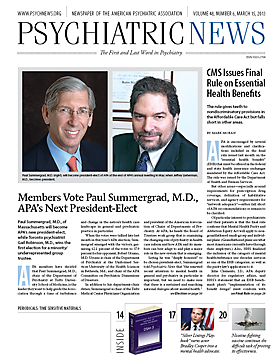APA concerns about implementation of the Physician Payment Sunshine Act (PPSA)—especially the need for a clearer dispute resolution process and a later start date for reporting by applicable manufacturers—have met with a favorable response from the federal Centers for Medicare and Medicaid Services (CMS).
In a final rule issued last month by CMS outlining regulations governing the act, the federal agency has pushed back manufacturers’ collection of data to August 1 and the required date for reporting to March 31, 2014. And now, in addition to having a minimum of 45 days to review and dispute reports submitted by applicable manufacturers to CMS, physicians and teaching hospitals will have 15 additional days.
These changes are the result of concerns raised by APA and other physician groups in public comments submitted in response to a proposed rule issued by the federal agency last year (Psychiatric News, March 16, 2012).
The PPSA was passed as part of the Affordable Care Act and requires manufacturers of drugs, devices, biologicals, or medical supplies covered under Medicare, Medicaid, or CHIP to report annually in electronic format to the secretary of Health and Human Services certain payments or other transfers of value to “covered recipients,” which it defines as physicians and teaching hospitals. The legislative intent behind the act is to foster transparency in payments and transfers of value made among manufacturers, group purchasing organizations, physicians, and teaching hospitals.
According to Julie Clements, J.D., APA deputy director for regulatory affairs, CMS creates in the final rule additional reporting categories, including a category that allows for a distinction to be made between faculty and speakers who present at accredited and certified CME programs versus nonaccredited CME programs. Speakers at accredited CME programs who meet criteria outlined by CMS in the rule need not be reported by manufacturers as recipients of payments or transfers of value.
In an extensive analysis of the final rule posted on APA’s Web site, Clements outlined the most important components of the rule in a question-and-answer format. A sample of the questions and responses includes the following:
When must data collection begin? The data-collection requirement will begin on August 1. (By statute, it was supposed to begin January 1, 2012. APA pushed for more preparation time.)
When must data be reported to CMS? Data must be reported to CMS by March 31, 2014. There will be no retroactive reporting.
Is reporting alone indicative of reported parties having been involved in wrongdoing or illegal conduct? CMS emphasizes that the inclusion of a payment or other transfer of value, or ownership or investment interest, on the public database does not mean that any of the parties involved were engaged in any wrongdoing or illegal conduct.
Who must file reports to CMS? Applicable manufacturers and group purchasing organizations must file reports. CMS revises the definition of “applicable manufacturer” by including the statutory phrase “operating in the United States,” which it defines as “having a physical location within the United States, or otherwise conducting activities within the United States or in a territory, possession, or commonwealth of the United States.”
Who qualifies as a “covered recipient” to be included in the applicable manufacturer’s report? A “covered recipient” is a physician or a teaching hospital (excluding physicians who are employees of the applicable manufacturer). “Teaching hospital” is defined as any institution that receives indirect medical education, direct graduate medical education, or psychiatric hospital indirect medical education payments. Payments or other transfers of value to medical residents do not have to be reported. CMS clarifies that payments or other transfers of value to non-health-care departments at universities affiliated with teaching hospitals should not be included in the reporting requirements. However, any payments or other transfers of value made through these departments to a covered recipient as indirect payments or other transfers of value must be reported as required for indirect payments. ■
